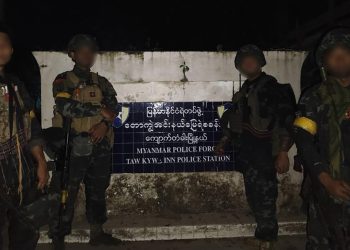Kyaw Zwa Moe, editor of The Irrawaddy’s English edition, reflects in this 2010 article on his arrest and imprisonment following the 1988 pro-democracy uprising, the 29th anniversary of which is commemorated this year.
The sway of the train woke me as the sun was rising in a mist on an endless horizon of paddy fields. What a beautiful morning! But what I didn’t know was that the train was not only taking me to Rangoon, where my mother was waiting for me, but that it was also the beginning of a much longer journey.
That night in Rangoon at my mother’s home, men entered the house. They asked for my mother’s “permission” to take me for questioning. My mother merely nodded, calmly. But I knew she was crying inside. The intruders took me to a chilly, isolated and bloodstained cell. It was December 1991.
I was arrested as a result of my actions during, and after, the 1988 pro-democracy uprising: on Aug. 7, 1988, I was in a street protest in Rangoon, eye-to-eye with a soldier whose bayonet was pointed at my body; in the following days, we marched in the streets, we ran from the soldiers when they fired their weapons; later, we secretly published a political journal and clandestinely distributed it; in secret military training, we practiced with wooden rifles; I traveled as a messenger to the Thai-Burmese border where my colleagues trained as a student army.
My work after the uprising caught the attention of local authorities and military intelligence units and our home was seen in their eyes as a “rebel” location. Four times, the house was surrounded and searched by army troops and military intelligence officers. On two occasions, they were looking for my older brother. Two times, they were looking for me.
That December night, they found me. A secret military court handed down a 10-year prison sentence. I was not allowed to present a defense.
My mother visited me in jail. She brought me the gift of smiles—no sad face or teary eyes. But again, I knew what she was feeling inside.
Eight years later, when I was released from prison, I returned home. I could only remember the smiles she so bravely gave me, because she had passed away during my third year in prison.
But the price I paid was small compared to some of my colleagues in 1988 and to some of my fellow prisoners. Tun Sein, Bo Ni Aung, Kyaw Theik, Htet Moe, Myint Aung and many others paid the highest price—death—during the 1988 protests or in prison, or following their release, or in exile.
Their sacrifice affected Burma’s history and has taken us to where we are today. Without their sacrifice during the 88 movement, late dictator Ne Win’s authoritarian socialist regime would not have been swept away. Without the movement, the junta wouldn’t have held the 1990 election, and the opposition National League for Democracy wouldn’t have been the clear winner. Without the movement, the junta wouldn’t have signed ceasefire agreements with ethnic armed groups, and they wouldn’t be where they are today. Without it, the junta wouldn’t have planned to hold elections this year. Without it, there would be no political parties to challenge the regime’s candidates. Without it, the exiled media wouldn’t have grown to be a reliable source of news and information about what goes on inside the regime’s closed, insular world.
We all recognize that the 88 generation and the following generations have paid a high price to get us where we are today, and about 2,100 political prisoners, including former student leader Min Ko Naing, still languish in jails. We must never forget that the road we go down today was built on the sacrifice of thousands of lives and souls.

















